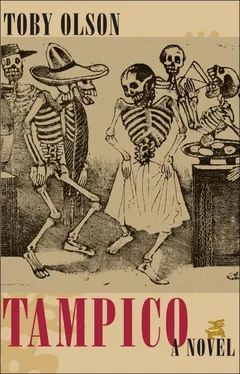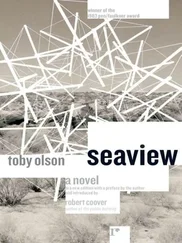That night, after he had bathed and rested, he walked the streets of the city, finding nothing that was familiar, but for the language he’d not spoken fluently since childhood and the postures and gestures of the older inhabitants, the few he found among the tourists. He sat on the bank of the Panuco. He entered a few shops, but he had nothing to buy. He ate his dinner, an ancient taste of tamales, at a stand on a busy street. He entered and sat for a while in the dark church. Then, on the way back to his hotel, he passed into a side street and came upon the lights above the door at the Lluvia del Oro and went in and crossed the dark crowded room and sat at the bar and ordered tequila. There were women in the place, prostitutes, but none approached him. They were there for the tourists and they thought him a local Mexican. He liked that, and only had to turn his head away when the eyes of a man fell on him, another kind of prostitute, in loose linen slacks and a shirt opened almost to the navel, whose lids had been darkened slightly with makeup.
The next afternoon he was back at the office again, this time ushered immediately into a room where a middle-aged man sat in his suit behind a large wooden desk. His hair was greased back in an older fashion, and Carlos could see the glint of wax in his thin mustache. The man rose from his chair and nodded, then pursed his lips, pointing to the chair across the desk, and Carlos sat down and the man settled into the leather of his own chair and swiveled slightly, glancing out the window to the side of the room. Carlos could see the copies of the deed and his documents and some other papers on the desk pad, the man’s fingers at the edge of them, a diamond ring in gold setting and carefully pared nails.
“English or Spanish?” the man asked, then sighed when Carlos answered, and tapped his fingers on the papers.
“This could have been so difficult,” he said.
“ ¿Por qué? ” Carlos said, and the man smiled.
“ Porque the Revolution. Muchos presidentes , generals, bandits, et cetera.”
“ ¿Pero? ” Carlos said.
“ Pero for this one, this Joaquín Sánchez.”
He lifted up a sheet of thin paper, and Carlos could see the formal handwriting through it and the impression of the seal under the signature.
“This letter, and these other documents he filed, perfectly executed. And your deed holds the impression of Obregón, who may well have been a pendejo , but the president of the country then, nevertheless.”
“Who is this Sánchez?”
“I don’t know nothing about that,” the man said. “Why he might have been involved in this. This is ancient material. I had to search it out. Lucky for you there was another one here. I didn’t have to look for it this time.”
“What do you mean, another?”
“I mean just that. Another person with a claim. Lucky for you it was a bad one, no damn good at all.”
“When was this?” Carlos asked.
The man swiveled in his chair again, looked at the wall, then out the window. Then he swiveled back.
“Well, you know,” he said. “I can’t say nothing about that. Who, and when it was. But it was recently. It was no damn good at all.”
“And Sánchez?”
“Of course,” the man said. “That’s how I searched out these papers. He’d filed all the proper references. In the files, you know? Even through the Revolution and after, the files are good, if you knew how to file things.”
“And Sánchez did.”
“That’s right. He was a gentleman of connections and influence back then. There were few like him. His name is on papers here frequently from those times. I’ve come across it. Very lawyerly. Though he was not a lawyer I don’t think. Ironclad, do you say?” He waved the letter between them. “This is very good stuff.”
“What does it say?”
“Says you are the owner of a house once owned by Roberto Menéndez, also known by Calaca in other papers, transferred to him in 1920, the deed then transferred to you in 1961. The house and whatever objects are within the house that remain, and the land, once surveyed and the survey officially recorded here in this office. And I rise now and offer my hand in congratulations.”
The land seemed to amount to a good number of acres, four at least to the front and sides, maybe even five, and Carlos wasn’t sure of the rear of the house yet and the foothills, how far the land might extend up into them. He’d hired surveyors who worked for the government and would handle the recording of their results officially, and when he turned from the veranda railing and looked out over the baked clay again to find them, they were gone, most probably working in the back now, he thought, and their truck was gone, a dull green Range Rover he’d ridden out in with them. He’d brought a sleeping bag, a canteen of water and a bag of food. He’d spend a night at the place, at least that, when they were gone. He didn’t know what he’d be doing after that.
It was late afternoon now, and the sun was sinking, and the breeze came up and stirred his sleeves, then receded and fell away and the air was still, and he saw the sand dust settling over the ruined causeway that had once been a crude landing strip, and the rougher ground and low brush beyond it, until the earth took on a clear solidity and ceased its shimmering, and the cloudless sky hardened into a deep blue, and he saw a few stars in the sky, though it was still day and bright under a milder sun. A man of property, he thought, his fingers stroking the weathered wood of the railing. Then he heard something. He thought it might be the surveyors, their voices and the sharp clack of their instruments in the clear air, the closing of the truck’s door, but it was not coming from the rear of the house, but from the side, and he turned back toward the fence and looked out beyond the gate and down the pathway toward the road.
He thought at first he was some aged peasant or an injured one, the shuffling of his feet in dusty huaraches, though they were not that, but boots, and his loose pants were conventional khakis, his brief-brimmed straw hat new and domed like a derby, a short, colorful feather in the decorative ribbon at the crown’s side. The hat hid his face, his fingers gathered in the vines and tendrils at the archway’s side, and the flowers shook and petals rained down over him as he shuffled through, and another man, even shorter than he was and wearing a large sombrero that looked ludicrous atop his small frame, came up from behind him and into the archway at his side, gripping his biceps, helping him and shuffling too, and the first shook free of his grip and said something, sharply, and a third man, heavier and lumbering, wearing a new Stetson and a white Mexican shirt, came into the space beside them, and the three were caught there for a moment, as men in a doorway in some old comic movie, their shoulders shifting, hands flailing at the bushes. Then they were through and standing side by side in the dirt road, brushing the petals from their clothing, reaching up to adjust their headgear, and Carlos saw a sort of cart come up to the side of the heavy man, someone behind it, holding handles. He thought it might be a wheelchair, but it was hard to see, so loaded as it was with objects: sleeping bags and a plastic cooler pressed together on the seat, pots and pans, canteens, coats and blankets, woven satchels, small leather purses, cases, all piled on top, or strapped or hanging loosely from the chair’s metal arms, some bouncing against the wheels. The man pushing it was dressed in garments that looked Japanese, some loose linen nightwear, tan, as were his tennis shoes. He had a thin mustache and wore a beaded skullcap covering what looked like a bald head. He, like the others, was squinting in the sun.
Читать дальше












